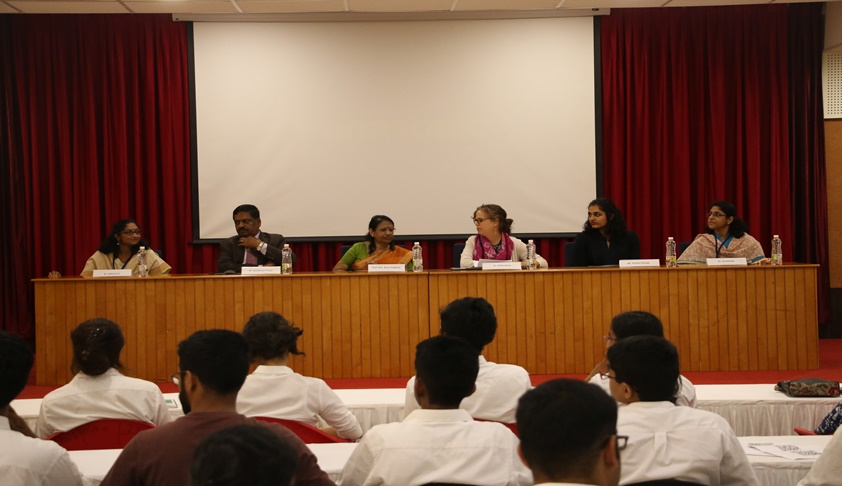NUALS: International Seminar On Health, Human Rights And IPR:Glimpse Of Technical Session I & II
manav malhotra
12 Oct 2017 9:48 PM IST

Discussions and deliberations on the three-day International Seminar on Health, Human Rights and IPR, being held at the National University of Advanced Legal Studies, held successfully. Law students, scholars and many among the legal fraternity flocked into the venue of the Seminar to lend their ears to the pertinent and futuristic aspects of Information and Communication Technology and related Human rights.
The dais witnessed the presence of eminent legal experts in the morning session. The list includes Dr. P.S Seema (Director, School of Legal Studies-CUSAT) as well as Dr. Arghya Sengupta (Research Director, Vidhi Centre for Legal Policy). Dr. Arghya Sengupta is also known for appearing as counsel in many high profile cases, including the Right to Privacy case.
The first technical session was on ‘Access to Information and Communication Technologies: Facets of Human Rights Involved’ was led by Dr. P.S Seema while Dr. Meena Kumari S ((Asst. Professor,GLC, Ernakulam) and Mrs. Sushma Susan George(Asst. Professor, Bharat Mata Law College, Ernakulam) acted as resource persons. They provided a joint effort in making the delegates familiarized with the theme of first session.
The gist of introductory session by Dr P.S.Seema was that different facades of human rights cannot be defined comprehensively. She added that technology has the potential to augment human rights as well as the disastrous ability to negate human rights. Dr. Meena Kumari S. briefed about how ‘Access to ICT’ is in itself a human right and at the same time a means to attain our rights. She also shared elaborately about the inherent threat to privacy that lies in the phenomenon of increasing access to ICT. Dr. Sushma, on the other hand, went on to make her point on the creation, manipulation and dissemination of the data in the Internet society we have built for ourselves. She cited it as the best example of something that replenish and constrain us simultaneously. The link between Net neutrality and non-discrimination principle was also made out by her.
The paper presenters who came after also conceded upon the fact that the right to development can be ensured only when there is sufficient access to information. Some of them expressed their concern for frequent internet shutdowns in several states of India that even hampers the iconic ‘Digital India’ Program. Right to privacy in cyber space was discussed in the light of Justice K.S Puttuswamy case and Shreya Singhal case.
The session was concluded by stressing upon the need to recognize the right to access to data in a free and fair manner, prevent unwarranted access to, and sharing and disclosure of such data by private players and governmental organizations, as well as to protect individuals from tracking their virtual as well as real time actions by corporate franchises.
Technical Session II on State Policy Vis-A-Vis Individual Rights: Changes Brought By ICT
The second technical session included topics under ‘Individual Rights in relation to ICT and Changes brought by ICT’. Dr. Arghya Sengupta (Research Director, Vidhi Centre for Legal Policy) chaired this session while Dr. Manoj Varghese (Former Director, Facebook India) and Adv. Shanmugam D Jayan (Visiting Faculty, NUALS & CUSAT,) acted as resource persons. Dr. Arghya Sen Gupta spoke about the issue of consent in ICT realm. He was followed by Dr. Manoj Varghese who elucidated upon the status of online data as a property of economic value. He also provided an introductory session about the safeguards to preserve privacy in Internet space and how can we ensure that the biometric information so collected is not utilized for other means than they are intended to be used. The dilemma lies in the lack of choice that the users face if they want to restrict access to their own information.
Adv. Shanmugham D Jayan discussed about the state policy regarding Information and Communication Technology and the recent judgement of the apex court regarding the same.
The paper presenters made their presentations on ‘National security, surveillance and privacy rights’ and the ‘Scope of privacy as a fundamental right in India’. The session was concluded with the hope that the judgment on Aadhar case pending before the Supreme Court would make the status of Right to privacy and ICT clearer. None of them digressed from their opinion that the need of the hour was a proper statutory legislation and not divergent Apex court judgements which may only complicate the issue.


